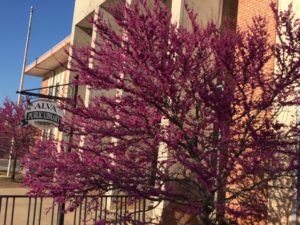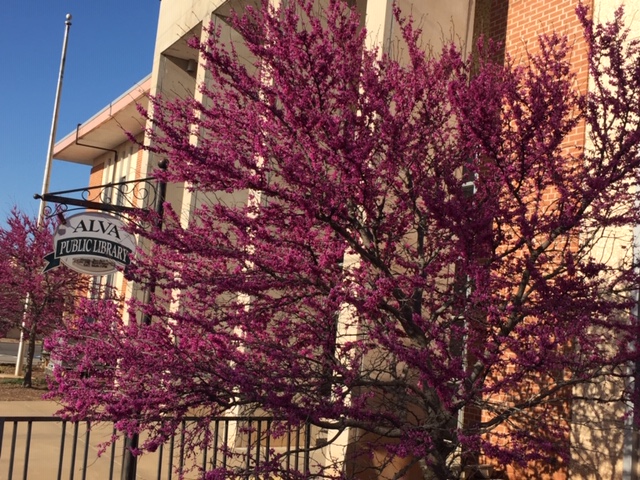By DR. KAYLENE ARMSTRONG, assistant professor of mass communication
April 3, 2020

The corona virus known as COVID-19 has not yet officially come to Alva, but it may as well have—it has already dug a furrow through the life of every person in this northwest Oklahoma farming community of 5,000.
Yet in the crisp, early morning air around the downtown square, it is as if nothing has happened in the town at all – until you start to read the signs posted on the business doors.
“For the safety of our staff and customers, we are closed until further notice.”
The Square is not really square but rectangular: two blocks east to west and one block north to south. The county and city buildings along with the post office sit in the center though the virus threat has closed all but the post office. Commercial buildings ring the outside, but many are empty anyway, a sign of the economics of a town ruled by oil prices that are so low that many of the oil pumps that dot the countryside sit idle as do the workers who keep them going. Gas is selling for $1.68 a gallon here, prices no one can seem to recall seeing for 20 years or more.
A brisk walk around the Square is a good way to start the day though you will likely be alone. No one is out these days. People are huddled in their homes, almost as if they are trying to barricade themselves against an invisible enemy that is slowly marching toward Alva. Yesterday, the closest reported virus was two counties away. Today, the virus is in the county next door. Some say it has been next door there for a while but officials just recently set up a testing station to prove it. If that is true, then when the Woods County Health Department starts testing on Monday, the monster will officially be here as well.
In the meantime, people are trying to cope. The governor has ordered all non-essential businesses to close. So the clothing boutiques and hair and nail salons won’t be open.
The banks offer drive-thru only.
No restaurants or fast food places are located on the Square, but the city’s handful of eating establishments, which are all out on the Boulevard five blocks south, too must be drive-thru or take-out only.
You can’t watch a movie at the Rialto downtown but you can visit the snack bar between noon and 5:30 p.m. for the cheapest fountain drinks in town, and maybe some popcorn or candy.
One carefully typed sign at Copper Penny tells customers that only 10 people can be inside at one time—the owners apparently don’t know about the governor’s non-essential order yet.
Daisy Village clothing boutique has its inventory online so customers can shop there, call the store and either have it delivered to their home or to their car waiting outside, according to the poster in the front window.
Cris Campbell’s real estate office posted reduced hours and even these are tentative: 10-ish until we’re done, maybe at 1.
Merrifield’s sign simply says “We are an essential business,” hand lettered in magic marker, an apparent response to criticism about being open when so many others are closed. The manager is already busy inside at 7:30 a.m., half an hour before it officially opens.
An invisible cloud seems to hang over downtown as people wonder how the businesses will survive economically after the viral threat is gone. Will more stores and other businesses close permanently? The thought of a dying downtown slipping further into the grave creates an even darker pall over the city. Even the cheerful pictures and hopeful sayings chalked on the sidewalks in front of many of the businesses do little to lift the cloud.
Yet a bright spot here and there is showing in the form of teddy bears. A slot next to Merrifield’s where another building used to be has been turned into what the city calls The Pocket Park. Three of the city’s many murals adorn the walls of the space with a lone bench sitting just inside the opening — a teddy bear perched on the seat.
Other bears can be found around the Square and all over town for that matter. It’s all part of a campaign to entertain children who, when driving with their parents, are challenged to find as many as possible lurking from behind glass doors and windowsills. Some are huge, certainly bigger than the kids who will enjoy spotting them—brown and pink at Starr Lumber, a panda at city hall.
Dr. Larry Smith, one of the town’s dentists, has two small bears peeking out from his office door, one wearing glasses and a face mask just as he does . The sign on the door promises he will be open again on April 6, which at least one patient with a throbbing tooth ache for the last week hopes is really true.
The senior center is closed for socializing but continues meals-on-wheels and offers only take-out lunches.
Next door, the library sits dark, but in a few hours, workers will arrive though not patrons. Library personnel are now offering curb service if you already know what book you want—sorry, no browsing allowed inside.
Mother Nature doesn’t know the virus is changing things in Alva, so spring continues to arrive as blooming tulips, daffodils and hyacinths sprout color and then fade. The red bud trees, which are the state tree of Oklahoma, offer splashes of varying shades of bright pink for a couple of weeks and then the relentless prairie winds will strip them bare and the leaves will take their place.
Eventually spring will march into summer, but things may still not be normal in Alva.
Things may never be normal again.

